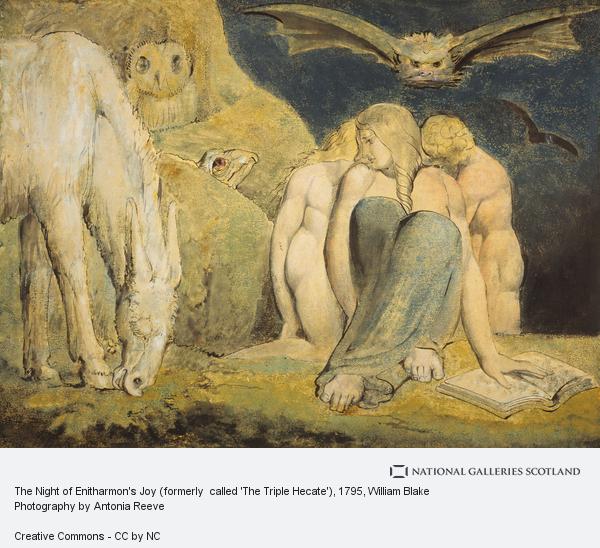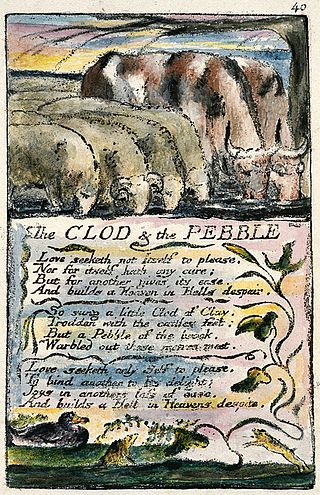 |
British Museum Illustrations to Young's Night Thoughts |
The King and the Corpse: Tales of the Soul's Conquest of Evil,
by Heinrich Zimmer, Edited by Joseph Campbell attempts to provide means
through which the reader can 'converse with the fascinating figures of
folklore and myth.' Zimmer seeks to give opportunities to delight in
encountering the 'well known symbols of life.'
Included in the book is the fifteenth century legend of Saint John Chrysostom who was the fourth century bishop of Constantinople. John was brought up by a pope to be the vehicle for relieving the suffering of a man in hell who had appealed to the pope. The innocent John was ordained a priest at the age of sixteen in order to offer masses for the condemned man. Realizing that his youth disqualified him communing with God as an intermediary for others, John withdrew to the wilderness to live as a hermit.
However when a girl appeared at his cell he allowed her in and he fell into sin. His remorse drove him to push the girl over a cliff, committing a worse sin. He sought forgiveness from the pope who had raised him like a son but he received only condemnation. Returning to the wilderness he resolved to live on all-fours like a beast until God would accept his atonement.
Years later through another miraculous intervention John was released to resume his priestly role and become a bishop 'serving God with the utmost devotion.'
On page 62 Zimmer wrote:
"He comprehended that the highest human office - that of communicating with God and dispensing God's grace in the form of the Eucharist - was meant to be held not by an 'innocent' but by one who had had 'experience.' 'I am yet too young! This must be very much against the Heavenly will.'...And the required experience John subsequently learned, was of those dark and evil forces which it is the virtue of the Holy Sacrament to overcome. The young priest's feeling of unworthiness sent him to the wilderness - but it was the wilderness of life.
...John's intuitive realization of his actual spiritual state and the sincere humility of his character prevent his seduction. His genius knows how important it is to integrate the wisdom of the dark powers from which he has been defended both by his clerical upbringing and by the innocence of his unassuming nature. Yet he cannot anticipate the humiliations, suffering and iniquities that the rugged path of integration through experience is going to entail. Nobody can ever anticipate such things...Such ignorance is basic - not only basic, actually salutary; for without it there can be no fructifying impact of experience, no 'new thing,' to take root, grow up, and mature through life into wisdom. Only he who is honestly ignorant can grow really wise."
Four Zoas, Night VI, Page 72, (E 349)
"O thou poor ruind world
Thou horrible ruin once like me thou wast all glorious
And now like me partaking desolate thy masters lot
Art thou O ruin the once glorious heaven are these thy rocks
Where joy sang in the trees & pleasure sported on the rivers
Page 73
And laughter sat beneath the Oaks & innocence sported round
Upon the green plains & sweet friendship met in palaces
And books & instruments of song & pictures of delight
Where are they whelmd beneath these ruins in horrible destruction t
And if Eternal falling I repose on the dark bosom
Of winds & waters or thence fall into a Void where air
Is not down falling thro immensity ever & ever
I lose my powers weakend every revolution till a death
Shuts up my powers then a seed in the vast womb of darkness
I dwell in dim oblivion. brooding over me the Enormous worlds
Reorganize me shooting forth in bones & flesh & blood
I am regenerated to fall or rise at will or to remain
A labourer of ages a dire discontent a living woe
Wandring in vain. Here will I fix my foot & here rebuild
Here Mountains of Brass promise much riches in their dreadful bosoms
So he began to dig forming of gold silver & iron
And brass vast instruments to measure out the immense & fix
The whole into another world better suited to obey
His will where none should dare oppose his will himself being King
Of All & all futurity be bound in his vast chain" ALL RELIGIONS are ONE, (E 1) "The Voice of one crying in the Wilderness
The Argument As the true method of knowledge is experiment
the true faculty of knowing must be the faculty which
experiences. This faculty I treat of." Four Zoas, Night II, Page 35, (E 325)
"What is the price of Experience do men buy it for a song
Or wisdom for a dance in the street? No it is bought with the price
Of all that a man hath his house his wife his children
Wisdom is sold in the desolate market where none come to buy
And in the witherd field where the farmer plows for bread in vain
It is an easy thing to triumph in the summers sun
And in the vintage & to sing on the waggon loaded with corn
It is an easy thing to talk of patience to the afflicted
To speak the laws of prudence to the houseless wanderer
Page 36
To listen to the hungry ravens cry in wintry season
When the red blood is filld with wine & with the marrow of lambs
It is an easy thing to laugh at wrathful elements
To hear the dog howl at the wintry door, the ox in the slaughter house moan
To see a god on every wind & a blessing on every blast
To hear sounds of love in the thunder storm that destroys our enemies house
To rejoice in the blight that covers his field, & the sickness that cuts off his children
While our olive & vine sing & laugh round our door & our children bring fruits & flowers
Then the groan & the dolor are quite forgotten & the slave grinding at the mill
And the captive in chains & the poor in the prison, & the soldier in the field
When the shatterd bone hath laid him groaning among the happier dead
It is an easy thing to rejoice in the tents of prosperity
Thus could I sing & thus rejoice, but it is not so with me!" Songs and Ballads, Notebook, (E 467)"I saw a chapel all of gold
That none did dare to enter in
And many weeping stood without
Weeping mourning worshipping
I saw a serpent rise between
The white pillars of the door
And he forcd & forcd & forcd
Down the golden hinges tore
And along the pavement sweet
Set with pearls & rubies bright
All his slimy length he drew
Till upon the altar white
Vomiting his poison out
On the bread & on the wine
So I turnd into a sty
And laid me down among the swine"Annotations to Swedenborg's Divine Love and Divine Wisdom, (E602)
"Understanding or Thought is not natural to Man it is
acquired by means of Suffering & Distress i.e Experience. Will,
Desire, Love, Rage, Envy, & all other Affections are Natural. but
Understanding is Acquired But Observe. without these is to be
less than Man. Man could never have received light from
heaven without aid of the affections" More posts about episodes of Living Like A Beast:
_object_44_Garden_of_Love.jpg)
_object_38_The_Nurses_Song.jpg)
_The_Human_Abstract.jpg)






